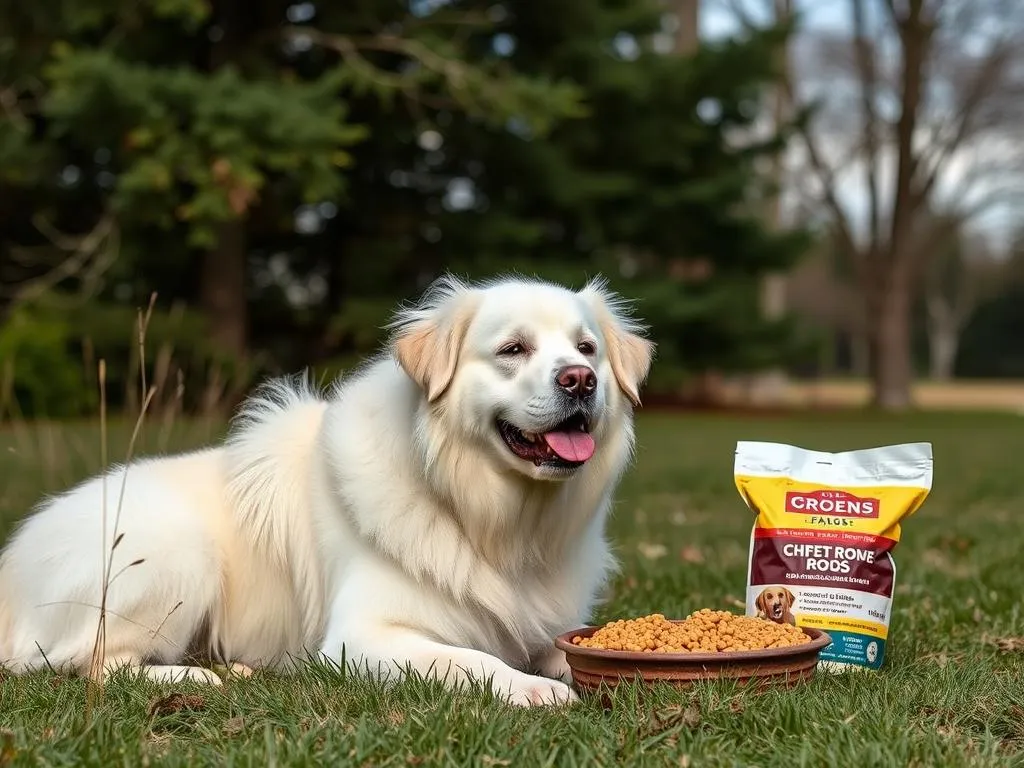
Introduction
Dog nutrition plays a pivotal role in the overall health and well-being of our canine companions. For large breeds like the Great Pyrenees, understanding their unique dietary needs is essential. Known for their impressive size and gentle temperament, Great Pyrenees require a balanced diet that supports their growth, energy levels, and health. This article focuses on the best dog foods for Great Pyrenees, highlighting the nutritional requirements specific to this majestic breed.
Understanding the Nutritional Needs of Great Pyrenees
Overview of Great Pyrenees Characteristics
The Great Pyrenees is a large, powerful dog breed, often weighing between 85 to 160 pounds. These dogs have a majestic and imposing appearance, characterized by their thick, white coat and strong build. Their size requires a diet rich in high-quality nutrients to maintain their health and vitality.
Great Pyrenees are generally calm but can exhibit bursts of energy, particularly during playtime or work. Their activity levels can vary greatly depending on their lifestyle, whether they are working dogs or family pets. Understanding their unique characteristics will help in tailoring their diet effectively.
Nutritional Requirements
For Great Pyrenees, certain nutrients are vital for maintaining good health. Here are the key components:
- Protein: Essential for muscle development and repair, a high-protein diet is crucial for Great Pyrenees, especially during their growth phases. Look for dog foods that list meat as the first ingredient.
- Fat: Healthy fats are important for energy and skin health. Omega-3 and Omega-6 fatty acids contribute to a shiny coat and overall well-being.
- Carbohydrates: While not the mainstay, carbohydrates can provide energy. Choose complex carbohydrates like sweet potatoes and brown rice over fillers.
- Vitamins and Minerals: A balanced diet should include essential vitamins (like A, D, E) and minerals (like calcium and phosphorus) to support bone and joint health.
Common Health Issues Related to Diet
Great Pyrenees are prone to specific health issues that can be influenced by their diet:
- Joint Health Concerns: Large breeds often face joint problems, such as hip dysplasia. Diets enriched with glucosamine and chondroitin can help support joint health.
- Obesity Risks: Due to their large size, Great Pyrenees are at risk of obesity, which can lead to other health issues. Portion control and high-quality ingredients are crucial.
- Skin and Coat Health: Their thick coat requires proper nutrition to maintain its condition. A diet rich in Omega fatty acids can prevent skin problems and promote a healthy coat.
Factors to Consider When Choosing Dog Food
Age and Life Stage
The dietary needs of a Great Pyrenees change as they grow. Puppies require a diet formulated for large breeds to support their rapid growth. Adult dogs need maintenance formulas, while senior dogs often benefit from lower-calorie options that prevent weight gain.
Activity Level
The activity level of your Great Pyrenees significantly impacts their caloric needs. Active dogs will require more calories to sustain their energy levels, whereas less active dogs will need a more controlled intake to avoid obesity.
Ingredient Quality
Not all dog foods are created equal. When selecting the best dog foods for Great Pyrenees, prioritize products with whole food ingredients rather than fillers. Understanding dog food labels is essential; look for named meat sources, whole grains, and avoid artificial preservatives and colors.
Types of Dog Food Suitable for Great Pyrenees
Dry Kibble
Dry kibble is a popular choice due to its convenience and shelf stability. Advantages include dental health benefits from chewing and ease of portion control. However, not all kibble is equal, and some may contain fillers that do not provide adequate nutrition.
Recommended Brands:
– Brand A: High in protein with real meat as the first ingredient. However, some dogs may find it less palatable.
– Brand B: Contains added joint support supplements but may be higher in calories.
– Brand C: Affordable with a balanced formulation, though it lacks premium ingredients.
Wet/Canned Food
Wet dog food can be a great option for hydration and palatability. Many Great Pyrenees enjoy the taste and texture of canned food, which can also be beneficial for senior dogs or those with dental issues.
Suggested Options:
– Brand D: Offers high-quality meat and a variety of flavors, but may be pricier.
– Brand E: Contains essential nutrients and is well-balanced for large breeds, though some formulas may have lower protein content.
Raw Diet
A raw diet consists of uncooked meat, bones, fruits, and vegetables. While some owners swear by this feeding method, it requires careful planning to ensure nutritional balance.
Considerations:
– Safety is paramount, as raw diets can pose risks if not handled correctly.
– Consult with a veterinarian before transitioning to a raw diet.
Home-Cooked Meals
Home-cooked meals allow for complete control over ingredients, ensuring high-quality nutrition tailored to your dog’s needs. However, it’s essential to consult with a veterinarian or pet nutritionist to ensure the meals are balanced.
Essential Ingredients:
– Lean meats (chicken, turkey, beef)
– Vegetables (carrots, peas, spinach)
– Whole grains (brown rice, oats)
Top Brands and Products for Great Pyrenees
High-Quality Dry Kibble Options
- Brand F: Formulated for large breeds with high protein content, although it may be on the pricier side.
- Brand G: Affordable and well-balanced, but may contain some fillers.
- Brand H: Known for its premium ingredients and added joint support, but not suitable for all budgets.
Premium Wet Food Choices
- Brand I: High-quality ingredients with a focus on meat and vegetables, though it can be costly.
- Brand J: Offers a variety of flavors and formulations but may contain higher sodium levels.
Recommended Raw Diet Products
- Brand K: Provides balanced raw meal options, but requires careful handling and storage.
- Brand L: Focused on high-quality ingredients, although it may not be readily available in all areas.
Feeding Guidelines for Great Pyrenees
Portion Control
Calculating daily caloric intake is crucial for managing your Great Pyrenees’s weight. Use the feeding guidelines on the dog food packaging, adjusting based on your dog’s activity level and weight goals.
Transitioning to New Food
When introducing a new food, do so gradually over a week to avoid digestive upset. Monitor your dog for signs of food intolerance, such as vomiting or diarrhea, and consult a veterinarian if needed.
Supplementation
Certain supplements may be beneficial for Great Pyrenees, especially those related to joint health or specific deficiencies. Always consult a veterinarian before adding supplements to your dog’s diet.
Common Myths About Dog Nutrition
Grain-Free Diets
The belief that grain-free diets are inherently better for dogs has been debunked. Many dogs can digest grains without issues, and some grain-free diets have been linked to health problems.
Protein Levels in Dog Food
While protein is essential, it’s not the only factor to consider. The source and quality of protein are equally important, particularly for large breeds like Great Pyrenees.
Homemade vs. Commercial Dog Food
Both homemade and commercial diets have their pros and cons. While homemade meals allow for ingredient control, they require careful planning to ensure nutritional adequacy. Commercial diets, particularly high-quality ones, are convenient and formulated to meet canine nutritional standards.
Conclusion
In conclusion, selecting the best dog foods for Great Pyrenees involves understanding their unique nutritional needs and considering factors like age, activity level, and ingredient quality. Prioritizing high-quality food tailored to their requirements can significantly impact their health and longevity. Consulting with a veterinarian for personalized dietary advice is always recommended to ensure your Great Pyrenees leads a happy, healthy life.









